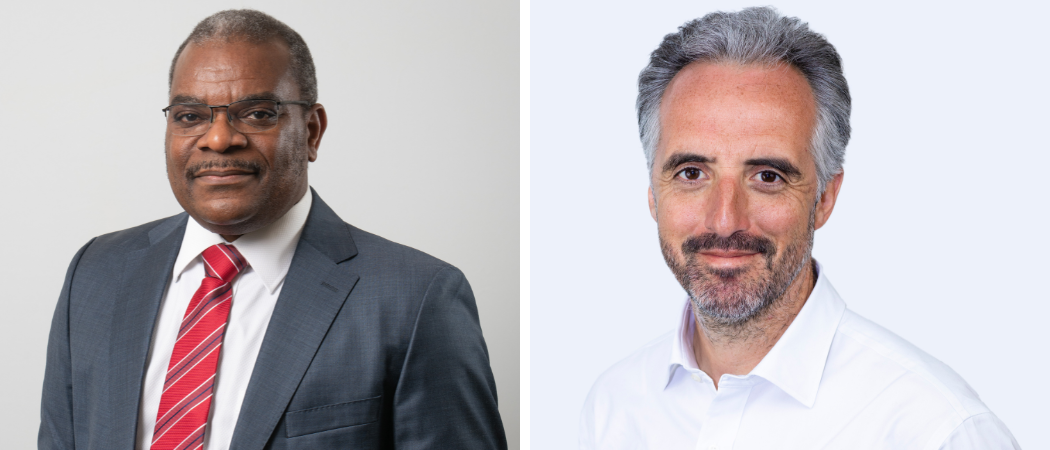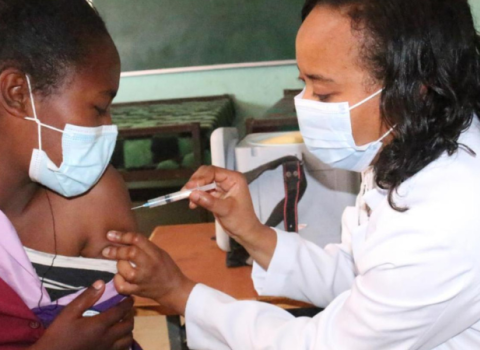Clinical research backed by the EU is bringing life-saving medicines and health tools to sub-Saharan Africa. This success story offers a valuable lesson as negotiations get underway on the next research programme

Michael Makanga (Left), executive director of the Global Health EDCTP3 joint undertaking and Luis Pizarro, executive director of the Drugs for Neglected Diseases initiative. Photo: Michel Mees / EDCTP & Ariane Mawaffo / DNDi
We received our medical training on opposite sides of the world, but were both horrified to learn about the nightmare illness human African trypanosomiasis, also known as sleeping sickness.
For one of us, studying to be a doctor in Chile and then in France, the disease was distant, but unique, for its terrifying symptoms. Sleeping sickness starts with aches and fever but then leads to severe neurological symptoms such as psychosis, aggressive behaviour - and the sleep disruptions that give the disease its name. Without treatment, almost all affected people die.
For the other of us, studying in Uganda and later in the UK, the disease was very close to home, where it is transmitted by tsetse flies that are only found in sub-Saharan Africa. Since the 19th century, hundreds of thousands of people have been killed in large sleeping sickness outbreaks, that have historically been fuelled by conflicts, forced displacement, malnutrition and encroachment on the fly’s natural habitat.
When we were medical students, the only treatment available for advanced sleeping sickness consisted of intravenous injections of an arsenic derivative. This is so toxic it killed 5% of patients.
Our professional paths have since been united by a shared commitment to tackle this terrible disease by developing safe and effective medicines. Thankfully there has been progress and the situation has improved dramatically.
After years of clinical trials to find better medications, in 2018 a new oral pill for the most common form of sleeping sickness was approved. The drug, fexinidazole, is safe and effective for Trypanosoma brucei gambiense sleeping sickness, which accounts for 93% of cases.
But fexinidazole was not approved – and had not been tested – in the rarer and more acute T.b. rhodesiense form of the disease, that occurs in East Africa. For these patients, the arsenic derivative was still the only option.
This finally changed in December 2023, when the European Medicines Agency (EMA) gave a positive scientific opinion for the use of fexinidazole against T. b rhodesiense sleeping sickness. That paves the way for the drug to be added to WHO’s treatment guidelines, and for national approvals and distribution in endemic countries.
EMA based its assessment on data from a clinical trial in Uganda and Malawi coordinated by the non-profit medical research organisation Drugs for Neglected Diseases initiative (DNDi), which was funded by the European & Developing Countries Clinical Trials Partnership (EDCTP), a programme supported by the EU and dedicated to funding clinical studies in sub-Saharan Africa.
The trial was made possible thanks to strong collaboration with African and European partners. Researchers, healthcare workers, and laboratory technicians in Malawi and Uganda, who were familiar with treating the disease but often had little prior experience of conducting clinical research, underwent training in state-of-the art practice, protocols, and procedures. Hospital and laboratory facilities were upgraded. The study strengthened the capacity of these sites to undertake a world-class clinical trial, leading to EMA approval.
For EDCTP, financing the study was a bold decision: success in pharmaceutical research is never guaranteed. But it turned out to be an inspired one. Not only will patients with T.b. rhodesiense sleeping sickness soon have a safe and effective drug – to be donated by French pharma Sanofi – but the scientists who conducted the trial are better placed to carry out research on other infectious diseases, including diseases with pandemic potential and those that are exacerbated by climate change.
As the EU prepares for negotiations on its next research Framework Programme, FP10, this success story proves the value and the impact of EU innovation funding mechanisms such as EDCTP.
The European Commission’s advisory group on research and innovation in the context of Africa-Europe cooperation has recognised EDCTP as, “the most-cited joint programme strengthening health research and health systems in Africa and the flagship EU-Africa partnership in health R&D cooperation, with large, successful, long-lasting research networks.”
EDCTP is currently being implemented as the Global Health EDCTP3 joint undertaking. This mechanism, with its aim of reducing the burden of poverty-related and neglected infectious diseases through clinical research and of strengthening research capacities to prepare for, and respond to, re-emerging infectious diseases , must feature prominently in FP10.
It must remain a cornerstone of the European Commission’s research and innovation strategy, given its significant convening power and its demonstrable ability to deliver treatments for potential pandemic diseases and diseases that are increasing in prevalence as result of climate change. For example, dengue outbreaks are becoming more intense and the disease is spreading outside of endemic tropical regions as the Aedes mosquitoes that carry it thrive due to warmer temperatures, increased rainfall, and flooding; today half of the world’s population is at risk.
The evidence indicates that more than half of infectious diseases are aggravated by climate hazards, and that zoonotic infections like sleeping sickness which are spread by insects or other vectors, are likely to affect a growing number of already vulnerable people who are facing the dual pressures of climate change and the risks generated by increased human encroachment on the environment.
We need to double down on efforts to develop solutions. We need a science-based approach, and we need scientists to be ready in the countries where these diseases are endemic.
The COVID-19 pandemic taught us that no one is safe until everyone is, and it taught us about the strategic value of building partnerships with Africa to tackle pandemics. As health equity and climate change issues will remain on the global agenda for decades to come, it is crucial that FP10 reflect this reality by expanding resources allocated to impactful investment mechanisms such as Global Health EDCTP3. It should also scale this model through investments in other geographies, where these diseases are also prevalent.
Investment to build clinical trial infrastructure on the African continent and elsewhere is also part of current WHO-led negotiations on a global agreement to better tackle future pandemics – underlining the inherent value and the necessity of this support.
EU decision makers should also consider a notable aspect of the fexinidazole success story: the model behind it. The drug was discovered, developed, and registered thanks to a not-for-profit R&D model involving DNDi, industrial partners, and researchers worldwide. This placed patients, scientists, and health authorities in endemic countries at the centre of the project.
This should provide inspiration for FP10 negotiators - to consider enhancing European financing mechanisms to support product development partnerships and other impactful, alternative models of innovation focused on addressing unmet public health needs.
The European Commission’s research and innovation strategy aims to move ‘faster towards a sustainable and prosperous future for people and planet, based on solidarity and respect for shared European values.’ Our work in Uganda and Malawi is a prime example of how this objective can be realised. We hope FP10 will continue to enable similar efforts to deliver life-saving medical innovations to everyone who needs them, without exception.
Michael Makanga is executive director of the Global Health EDCTP3 joint undertaking. Luis Pizarro is executive director of the Drugs for Neglected Diseases initiative.





 A unique international forum for public research organisations and companies to connect their external engagement with strategic interests around their R&D system.
A unique international forum for public research organisations and companies to connect their external engagement with strategic interests around their R&D system.